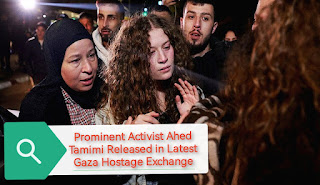_edit_3192633660165959.jpg)
In a significant turn of events, Ahed Tamimi, the 22-year-old Palestinian activist, has been released from Israeli prisons as part of the latest exchange for hostages held in Gaza. This release follows her arrest on November 6, when the Israeli military detained her on suspicion of inciting violence and promoting terrorist activities.
Arrest and Detention
Tamimi's arrest occurred during a predawn raid, and she was subsequently held in Damon Prison near Haifa, Israel, for nearly three weeks without being charged. Reports from her lawyer, Mahmoud Hassan, highlight allegations of physical mistreatment during her arrest and transfer, violating international law.
The military initially sought to place Tamimi under administrative detention, allowing indefinite holding without charges or trial. However, her name later appeared on the Israeli government's list of approved Palestinian prisoners for potential release in the hostage exchange.
Family's Struggle and Threats
Tamimi's mother, Nariman Tamimi, expressed a mix of joy and concern over her daughter's release. The family faced threats of violence from Israeli settlers and occupation forces, leading to a subdued atmosphere despite the anticipation of Ahed's return. Nariman Tamimi highlighted the broader context of the conflict, acknowledging the loss of thousands of lives in Gaza.
Wider Crackdown and Casualties
Ahed Tamimi's arrest was part of a broader crackdown initiated by Israeli forces in the occupied West Bank after Hamas attacks on October 7. The number of Palestinians arrested remains disputed, with the Israeli military reporting over 2,000, while the Palestinian Authority's commission for prisoner affairs suggests nearly 3,300.
The situation in the West Bank has escalated, with at least 225 Palestinians killed, marking 2023 as the deadliest year for Palestinians in the region since 2005, according to the United Nations' humanitarian agency.
Hostage Exchange and Released Individuals
In the recent exchange, a total of 30 Palestinians, including women and children, were released. Among them was Suhair al-Barghouti, a 64-year-old woman held in administrative detention since October. She faced challenges accessing medication for her health issues, as reported by the Palestinian Prisoners Society.
The al-Barghouti family has a history of resistance against Israeli occupation, with Suhair's husband, Omar al-Barghouti, being one of the longest-serving Palestinian prisoners until his death in 2021.
International Reactions and Humanitarian Concerns
The release of Ahed Tamimi has drawn attention and reactions from the international community. Human rights organizations have criticized the Israeli military's crackdown and the use of administrative detention, calling for a transparent and fair legal process for individuals detained.
The United Nations has expressed deep concern over the escalating violence in the West Bank and the high number of casualties. The humanitarian impact of the conflict, with thousands believed to be trapped under the rubble in Gaza, adds urgency to calls for a ceasefire and a comprehensive resolution to the longstanding conflict.
Impact on Palestinian Families and Communities
The release of Ahed Tamimi and others is undoubtedly a moment of relief for their families, but it is essential to recognize the lasting impact on Palestinian communities. The loss of lives, destruction of homes, and the psychological toll of the conflict contribute to a challenging environment for those attempting to rebuild their lives.
Nariman Tamimi, reflecting on her daughter's release, emphasized the somber reality that Ahed returns amid the death of thousands. The broader narrative extends beyond individual releases, encapsulating the struggles of numerous families affected by the conflict.
Challenges of Reintegration and Continued Strife
While the release of detainees brings a glimmer of hope, the challenges of reintegration into a society scarred by conflict cannot be underestimated. The emotional and physical toll on individuals, particularly those who have been detained for an extended period, requires comprehensive support systems.
The broader political landscape also poses challenges to sustainable peace. The cycle of arrests, protests, and violence persists, making it imperative for diplomatic efforts to address the root causes and create a conducive environment for a lasting resolution.
Looking Forward: Advocacy for Peace and Human Rights
As the Israeli-Palestinian conflict continues to unfold, it is essential for individuals, organizations, and nations to advocate for a peaceful and just resolution. The adherence to international law, respect for human rights, and dialogue between all stakeholders remain critical components of a sustainable path forward.
The plight of individuals like Ahed Tamimi underscores the importance of addressing the underlying issues that contribute to the cycle of conflict. The international community plays a crucial role in supporting initiatives that promote understanding, tolerance, and cooperation between Israelis and Palestinians.
In conclusion, Ahed Tamimi's release serves as a focal point for broader discussions on the impact of the Israeli-Palestinian conflict. While individual releases offer moments of relief, the persistent challenges and complexities underscore the need for sustained efforts toward a comprehensive and lasting resolution. Advocacy for peace, human rights, and international collaboration remains paramount in navigating the path ahead.

.png)